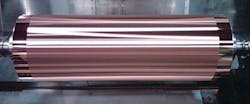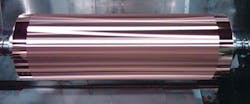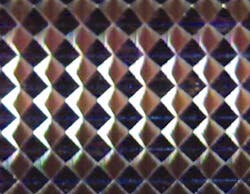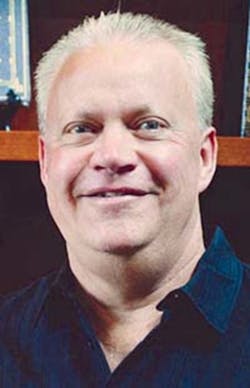JacoTech boosts engraving units to keep up with TV market
Envision a television screen and think about how the technology has changed over the past five, 10, 20 years. Screens are more sophisticated in their capacity to manage light, which has enhanced the experience of the viewer. Because of layered screens and lens arrays, viewers no longer need special glasses to have the 3-D experience — the images can appear to pop 2 to 3 feet out of the screen. Such an experience is due to innovations in microstructured mold components with optical quality surfaces.
Molds and tooling used to produce such effects are stock in trade at Jacobsen Lenticular Tool & Cylinder Engraving Technologies Co., Itasca, Ill., which goes by the shortened name of JacoTech. At its facility, the company produces engraved cylinders, drums, rolls and mandrels used to emboss sheet with special patterns of lenses that can create the sorts of effects you've come to expect in 3-D movies. In some applications, as many as 300 microlenses, called lenticules for their lenticular shape, are printed on each square inch, allowing for sophisticated visual effects. Besides TV screens, JacoTech's customers' end-use products include promotional materials, signs and other products that use holographic images, three-dimensional effects or reflective qualities.
President and owner Gary Jacobsen is seeing demand increase for these types of products and is making changes to keep up. The focus of JacoTech's custom optical micromachining business is ultra-precise CNC diamond turning, milling, fly cutting and laser ablation.
"The size of our equipment keeps getting larger because we're trying to keep up with the demands of the market," he says. "TV screens keep getting bigger and bigger."
Jacobsen emphasized that manufacturers are looking for engraving machinery that is wider than what is now available in order to produce, for example, 80-inch and larger television screens. He also is expecting increased demand from windmill components and products used in space exploration.
For large TV screens, extruded or cast plastic sheet works best when configured in one piece, as opposed to joining two or three panels together, which creates seams. Consequently, the company is planning to install a CNC machining center more than 17 feet wide to produce "uninterrupted sized panels" to be used as molds up to 15 feet wide. Currently, it uses machining centers that are about 6.5 feet and 10 feet wide to make engraved products for making lenticular sheet. The company also will add larger copper/chrome tanks to enable it to plate plastic processing rolls up to 17.4 feet wide.
It is with these machining centers that such intricate work is possible. The company's optical grade engraved-cylinder processing molds can feature simple or complex geometrical patterns designed to perform a number of complicated light- management functions, it says.
Using its custom-designed, large-scale diamond turning equipment, JacoTech engraves complex, custom optical patterns into materials such as copper, aluminum, electrolytic and electroless nickel alloys, beryllium copper, brass, gold and more, depending on the customer's needs and the specifications of the product the customer intends to produce.
IMPROVING THE VISUAL QUALITY OF EXTRUDED LENTICULAR SHEETS
JacoTech has strived to improve optical lens designs, diamond tooling and engraved-cylinder- mold processing to meet the ever-increasing requirements of world-class producers of extruded lenticular sheets. "It's very intricate to make things repeatable," Jacobsen says. "That is another thing that we've improved. Our rolls are guaranteed to be repeatable time after time."
The company can provide engraved cylinders to create lenticular lenses with ultra-low surface waviness as compared to standard engraved cylinders. Its products also have achieved customized shaping of the lenticular lens surface to create much sharper, clearer and greater apparent depth for 3-D animation and printed images that simulate motion. In addition, the company has a proprietary method of mitigating the image static or noise from diamond machining and optical banding that can lower sheet quality. In a visual inspection, the image static or noise is apparent when the sheet is held up to light.
JacoTech emphasizes the material cost savings of using advanced prismatic web roll production to make retroreflective surfaces. With this technology, patterns of triangular pyramids are stamped directly onto sheet, which can then be applied to products such as license plates and road signs. The technology presents significant benefits over the other methods that have been used for these high-volume products, Jacobosen says. The other methods include injection molding and casting. Injection molding is slow and performed one piece at a time. Casting also is very slow in its foot-per-minute output. But JacoTech created a method of directly engraving pyramids into cylinders that can be used to create prismatic materials in web form. These engravings are designed for maximum sheet machine line speeds that are set by the machinery maker.
JacoTech's customers closely monitor raw material prices and often ask JacoTech for new optical lens designs and engraved cylinders for process modification. Jacobsen pointed out that lately, Asian-based extruders are switching from PET to lower-priced resins such as PP.
This affects the work the firm does. "Then we need to work on a brand-new optical lens design," Jacobsen says. "The clarity and melting points of resins are slightly different. Is it soft, is it more rigid? When it comes off the drum, is it going to shrink down?"
Making sure that the patterns of the lenses imprinted on sheet are precise also is critical, especially as manufacturers change resins, Jacobsen says.
"The diamond shapes are different, how we cut into them, our speeds. If you don't do stuff like that, you get anomalies in the sheet," he says.
The company is in ongoing R&D to comply with evolving international standards for optical based light-management products and devices.
Angie DeRosa, managing editor
Contact:
JacoTech, 630-467-0900, www.jacotech.com



